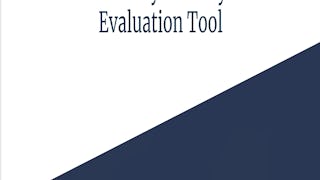This course provides an introduction to household surveys for program evaluation in low-and middle-income countries. The course will equip you with skills to:



Household Surveys for Program Evaluation in LMICs
This course is part of Evaluating Large-Scale Health Programs Specialization



Instructors: Abdoulaye Maïga
Included with 
Recommended experience
Recommended experience
Skills you'll gain
Details to know

Add to your LinkedIn profile
See how employees at top companies are mastering in-demand skills

Build your subject-matter expertise
- Learn new concepts from industry experts
- Gain a foundational understanding of a subject or tool
- Develop job-relevant skills with hands-on projects
- Earn a shareable career certificate

There are 6 modules in this course
This module will cover an overview of intervention coverage, using existing coverage data, and special topics in coverage.
What's included
14 videos12 readings1 assignment
This module will cover survey design and survey planning.
What's included
20 videos1 assignment
This module will cover sampling design and mapping.
What's included
17 videos2 readings1 assignment
This module will cover survey tool development.
What's included
10 videos3 readings1 assignment2 peer reviews
This module will cover preparing fieldwork, data quality assurance, and data collection.
What's included
27 videos1 reading1 assignment
This module will cover data management & analysis and synthesizing data.
What's included
10 videos2 readings2 assignments
Earn a career certificate
Add this credential to your LinkedIn profile, resume, or CV. Share it on social media and in your performance review.
Instructors



Offered by
Explore more from Public Health
 Status: Free Trial
Status: Free TrialJohns Hopkins University
 Status: Free Trial
Status: Free TrialJohns Hopkins University
 Status: Free Trial
Status: Free TrialUniversity of Maryland, College Park

Coursera Project Network
Why people choose Coursera for their career





Open new doors with Coursera Plus
Unlimited access to 10,000+ world-class courses, hands-on projects, and job-ready certificate programs - all included in your subscription
Advance your career with an online degree
Earn a degree from world-class universities - 100% online
Join over 3,400 global companies that choose Coursera for Business
Upskill your employees to excel in the digital economy
Frequently asked questions
To access the course materials, assignments and to earn a Certificate, you will need to purchase the Certificate experience when you enroll in a course. You can try a Free Trial instead, or apply for Financial Aid. The course may offer 'Full Course, No Certificate' instead. This option lets you see all course materials, submit required assessments, and get a final grade. This also means that you will not be able to purchase a Certificate experience.
When you enroll in the course, you get access to all of the courses in the Specialization, and you earn a certificate when you complete the work. Your electronic Certificate will be added to your Accomplishments page - from there, you can print your Certificate or add it to your LinkedIn profile.
If you subscribed, you get a 7-day free trial during which you can cancel at no penalty. After that, we don’t give refunds, but you can cancel your subscription at any time. See our full refund policy.
More questions
Financial aid available,
¹ Some assignments in this course are AI-graded. For these assignments, your data will be used in accordance with Coursera's Privacy Notice.


